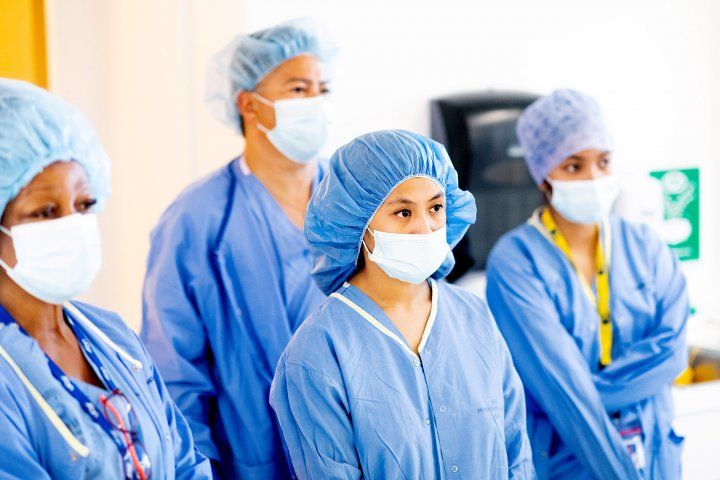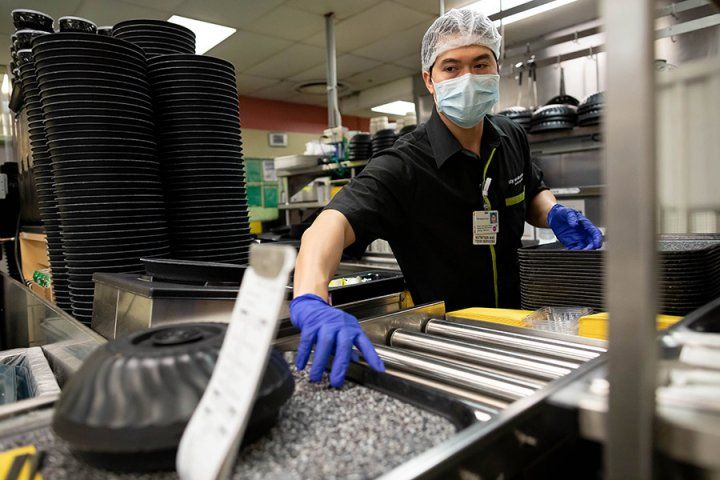Philanthropy Helps UCSF Faculty and Staff Cope With COVID-19

Patricia Reyes and fellow UCSF sterile processing technicians listen during a Day in the Life drill while preparing to open a COVID-19 ward at UCSF’s Mount Zion campus. A new COVID-19 Faculty and Staff Morale Support Fund will help to support UCSF’s frontline workers. Photo by Noah Berger
As a clinician, Beth Harleman, MD, has seen firsthand how the COVID-19 pandemic is affecting her colleagues. It has thrown into chaos not only how they work but also how they live. A deluge of new protocols has added new stresses to every aspect of patient care, from lab-test interpretation to patient visits. Many clinicians working from their homes must balance video and telephone patient visits with caring for children or other family members. Those working on-site in clinics, hospital units, and emergency departments worry about getting sick and infecting their own families.
“For all of us in health care, there is an unspoken expectation that we leave our emotions, well being, and personal needs at the door,” said Harleman, associate chair for faculty experience in the UCSF Department of Medicine. “This selflessness is what drew me to medicine. It’s noble and beautiful, but ultimately, it's much harder to help other people when we're not balanced and emotionally well.”
Recognizing that helping support the wellness of care providers was a unique and meaningful way they could contribute to the pandemic response, Pete and Devon Briger recently made a $1 million gift to create a COVID-19 Faculty and Staff Morale Support Fund.
“We’ve been struck by the excellence, the determination, and the quality of care that we’ve seen at all levels at UCSF,” said Pete Briger, a member of the UCSF Foundation Board of Directors. “We were excited to do something to help make people’s lives better, especially those on the front lines of the COVID-19 crisis.”
The Brigers’ gift will benefit faculty and staff members across all UCSF schools and sites through two mechanisms. First, it will fund grants of up to $5,000 to support well-being and cohesiveness within UCSF. Projects can include activities such as remote yoga classes or fitness challenges, seminars on parenting, or practicing mindfulness; pursuing collaborative scholarship during the pandemic; or community-building initiatives. Project proposals will be evaluated by a committee co-chaired by Harleman and Stephanie Belger, director of strategic initiatives in the School of Medicine.

Lorenzo Mauricio, senior food service worker in the department of Nutrition and Food Services, prepares a dinner order for the Langley Porter Psychiatric Hospital. With frontline staff working during the pandemic, UCSF is working to help employees deal with potential anxiety and distress. Photo by Susan Merrell
The gift also will help expand and enhance the resources available through the UCSF Employee Coping and Resiliency Program, which helps employees deal with anxiety and distress resulting from the pandemic. The program was created by Maga Jackson-Triche, MD, MSHS, vice president for adult behavioral health services at UCSF Health and professor and vice chair for adult psychiatry in the UCSF Department of Psychiatry.
The program’s Digital Cope Tool assesses users’ needs and recommends resources such as self-care webinars, videos, and apps, as well as more specialized interventions including consultation with a mental health care practitioner. “This digital platform lets people access resources in a convenient, confidential manner,” said Jackson-Triche. “It takes the struggle out of trying to find mental health care.”
Since launching in April, the tool has been accessed more than 20,000 times and has produced 282 referrals to UCSF Department of Psychiatry and Behavioral Sciences clinicians.
“Clearly there is a need for this kind of support and intervention,” said Harleman. “This gift is a tangible recognition of how important the well-being and morale of our faculty and staff members is to our ability to care for patients.”